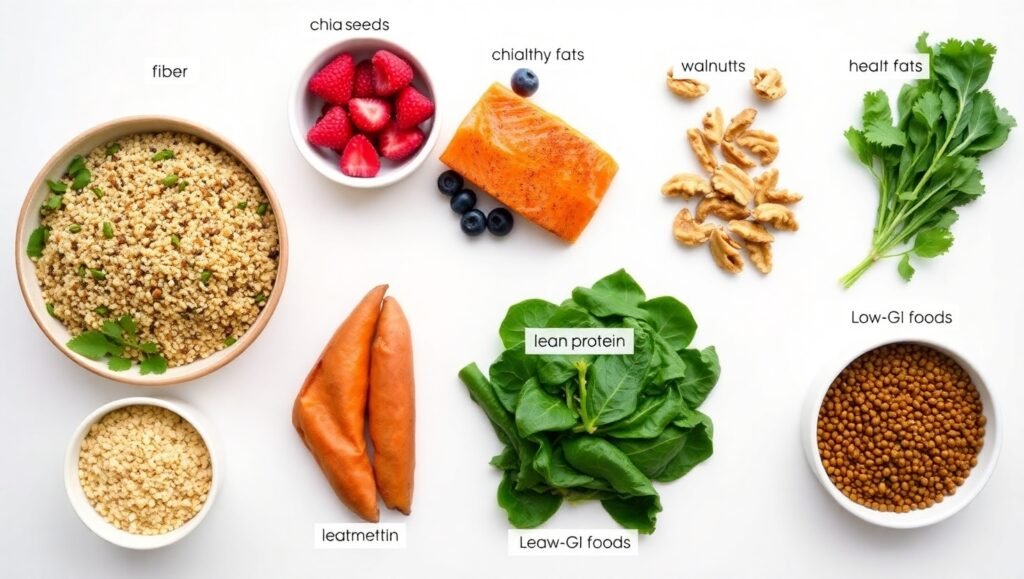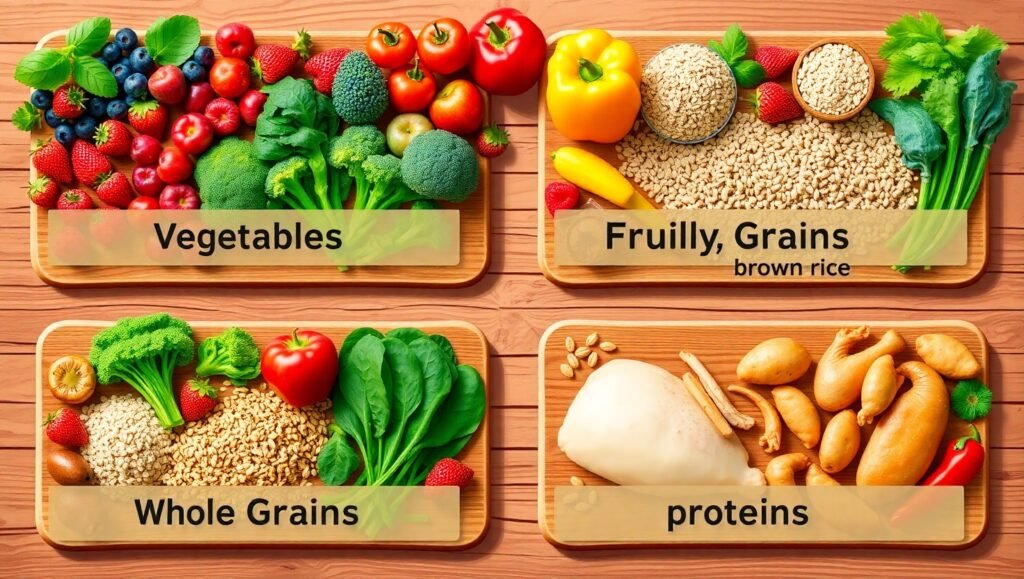
Nutrition Basics for PCOS: Essential Foods for Better Health in 2025
Dealing with Polycystic Ovarian Syndrome (PCOS) is quite demanding, yet having a sufficient understanding of the principles of nutrition would make a noticeable difference in the state of your health. As 2025 rapidly approaches, it is the right time to pay attention to vital items, which can contribute to your health. The following are important lessons that can help you eat your way into a healthier life.
Understanding PCOS
PCOS is a hormonal condition that occurs in a sizeable number of women in the reproductive phase. It may provoke a series of health issues, including the increase in weight and abnormal menstrual cycles, as well as increase the risk of diabetes. One of the best measures to deal with PCOS is good nutrition to make hormones into balance and to bring well-being.
Essential Nutrients for PCOS
Symptoms of PCOS can be mitigated by eating a balanced diet that contains a wide array of nutrients. Focus on foods which are high in the following nutrients:
- Fiber: High‑fiber foods boost insulin sensitivity. Choose fruits, vegetables, whole grains, and legumes.
- Healthy Fats: Add omega -3 fats like salmon, chia seeds and walnuts. These are the fats that decrease inflammation and maintain good health of the heart.
- Lean Proteins: Eat low-fat meats, fish, eggs and plant sources such as lentils and beans. They make you full and normalize the blood sugar level.
- Low-Glycemic Index Foods: The foods that take time to release sugar into the blood are necessary. Choose sweet potatoes and quinoa and the majority of fruits to regulate the insulin levels.
Foods to Include
It is essential that correct foods are chosen to control the symptoms of PCOS. Foods to add to your daily diet include below:
| Food Type | Examples | Benefits |
|---|---|---|
| Fruits | Berries, apples, and pears | High in fiber and antioxidants |
| Vegetables | Leafy greens, broccoli, and bell peppers | Rich in vitamins and minerals |
| Whole Grains | Oats, brown rice, and whole-wheat bread | Promotes digestive health and sustained energy |
| Protein Sources | Chicken, fish, tofu, and tempeh | Helps with muscle maintenance and satiety |
| Dairy or Dairy Alternatives | Greek yogurt, almond milk | Provides probiotics and calcium |
Hydration Matters
Consuming a minimum of water is fundamental to healthy body operations and may assist in managing weight. You should get at least eight glasses daily and include herbal teas as you like. Sugary beverages should be avoided and caffeine should be minimized because it can aggravate the symptoms.
Meal Planning Tips
Eating balanced foods that contain nutrients is ensured by planning meals. Here are simple ideas:
- Prepare Meals in Advance: Cooking your meals ahead of time can help you stick to healthier choices during the week.
- Balanced Plates: Aim to fill half your plate with vegetables, a quarter with protein, and a quarter with whole grains at each meal.
- Snack Wisely: Keep healthy snacks like nuts, yogurt, or sliced veggies on hand for quick, nutritious options.
Listen to Your Body
All individuals respond to foods in different ways. Monitor the influence foods have on you and change your diet. A food diary will also assist in identifying the trends and making healthier decisions.
When you strive to improve your health in 2025, it is important to remember that nutrition is the key to controlling PCOS. Pay attention to right food, water, and meal planning. Minor changes give major outcomes- begin today!
The Insulin Resistance and How to Deal with It on PCOS.

Polycystic Ovarian Syndrome (PCOS) is a disease that afflicts a large number of women across the world. One of the major reasons that can aggravate PCOS is insulin resistance. How insulin resistance functions will help you manage your condition and enhance overall health, so you feel confident enough to make healthy lifestyle and nutritional decisions.
Insulin is a pancreas hormone that controls blood sugar. Carbohydrates are decomposed into glucose and are released to the blood after eating. Insulin directs cells to take up glucose to be used as energy or stored. When insulin is not responded to by cells, it follows that they are resistant and in turn, the body produces more insulin. Elevated insulin levels have the potential to lead to health issues particularly to women with PCOS.
The following are some of the major features of insulin resistance that should be considered to understand how it influences PCOS:
- Hormonal Imbalance: The resistance to insulin may elevate the level of male hormones, including testosterone. Excessive growth of hair, acne and abnormal periods can be as a result of high testosterone.
- Weight Gain: The result of insulin resistance is weight gain, particularly about the belly. All the increased insulin levels trigger the storage of fat and losing weight becomes difficult.
- High Possibility of diabetes: Insulin-resistant women with PCOS have a greater chance of type 2 diabetes in adulthood. The prenatal monitoring of blood sugar and consuming healthy food is crucial to prevention.
- Cardiovascular Health: With insulin resistance, the blood pressure and cholesterol may increase, which leads to the risk of heart diseases.
Some change in lifestyles may help in countering insulin resistance. Some of the easy but good ideas are:
- Eat a Balanced Diet: Emphasize whole foods- vegetables, fruits, whole grains, low-fat proteins and healthy fat. Select low glycemic foods to maintain a stable level of blood sugar.
- Frequent Physical activity: Frequent exercise enhances insulin sensitivity. Aim for at least 150 minutes of moderate aerobic exercise each week.
- Weight Management: Even a small weight loss of 5-10 percent will go a long way in enhancing insulin sensitivity and PCOS symptoms.
- Mind Your Portion: Dividing more frequent meals can help keep your blood sugar steady during the day.
Also, you need to know the responses of your body to various foods and habits. The food diary will help you learn what foods increase your blood sugar.
The other important factor is the use of supplements in treatment of insulin resistance. Some vitamins and minerals can possibly help insulin properly work, including:
- Inositol: The supplement could make insulin more sensitive and help with ovulation.
- Vitamin D: Deficiency of vitamin-D is prevalent among women with PCOS, and intake of supplements can help.
- Omega -3 Fatty acids: These prevent inflammation and increase insulin sensitivity.
As you consider the variety, seek the healthcare professional guidance. They are able to direct your eating habits and even assist you in choosing the appropriate supplements.
It is also important to be aware of your condition and join other groups of experienced women. Support groups provide great ideas, observations and motivation as you cope with PCOS as a unit.
Insulin resistance is the central aspect to consider when management of PCOS is concerned. Your health and a more balanced life can be achieved by taking informed lifestyle choices. You are able to bring about changes which are sustainable with dedication.
The Role of Weight Management in Managing PCOS Symptoms

Treating PCOS (Polycystic Ovarian Syndrome) is sometimes a daunting experience, however, when you realize the fact that weight management is a simple, yet important part of your health, it can make a huge difference. Obesity and weight gain are some of the challenges that many PCOS patients find difficult to deal with, and they can also exacerbate the symptoms. Keeping the weight right will help you to enhance insulin sensitivity, maintain a healthy menstrual cycle, and lower the likelihood of getting other health issues.
The individuals with PCOS are the ones that experience insulin resistance. Weight gain may be caused when the body is unable to utilize insulin. Small and manageable steps in managing both your weight will enhance insulin sensitivity. Some useful weight-management tips are as follows:
- Balanced Diet: Pay attention to a diet of whole foods. Include plenty of fruits, vegetables, whole grains, lean proteins, and healthy fats. Unhealthy foods that have been subjected to limit processing and contain high levels of refined sugars and unhealthy fats.
- Portion Control: Beware of portion sizes in order to keep to a healthy weight. Portions can be made easy to control by using smaller plates.
- Regular Exercise: Aim for at least 150 minutes of moderate aerobic activity each week. Add strength training for all major muscle groups twice a week for extra benefits.
- Mindful Eating: Have mindful eating where you take your food slowly and be responsive to the hunger of your body. Do not distract during meals to prevent overeating.
Our weight management is not necessarily about shedding the pounds; it is about developing a balanced process that suits your lifestyle. The following is a more detailed way in which these practices can be used to control PCOS symptoms:
- Better Hormonal balance: A small percentage of body weight loss can assist in hormone regulation and minimize symptoms.
- Improved Fertility: Being at a healthy weight may increase ovulation, as well as fertility, in individuals desiring to have children.
- Lower Risk Factors: Being in the right weight minimizes the chances of the associated diseases like diabetes and heart disease.
PCOS weight management requires a balanced diet. Meal planning can be made simpler by being familiar with foods to prefer. A table of potentially useful foods is below:
| Food Group | Examples | Benefits |
|---|---|---|
| Fruits and Vegetables | Leafy greens, berries, peppers | Rich in fiber, vitamins, and antioxidants |
| Whole Grains | Brown rice, oats, quinoa | Higher fiber content, helps with satiety |
| Lean Proteins | Chicken, fish, tofu | Supports muscle maintenance, reduces hunger |
| Healthy Fats | Avocado, nuts, olive oil | Promotes heart health and reduces inflammation |
The management of PCOS and weight includes maintaining a hydration level. Water enables you to suppress hunger and high metabolism. At least eight glasses a day should be the goal, and you can add herbal teas.
Sleep and stress management play important roles. Poor sleeping may disrupt hormones and complicate weight regulation. Attempt to have 7 9 hours of good sleep per night. Decline stress using yoga, meditation or deep-breathing exercises, which will assist you not to emotionally eat.
The PCOS experience of everyone is unique. What benefits one individual, might not benefit the other, therefore, patience and be easy on yourself. Monitor your progress and get assistance of doctors, dietitians or support groups. These measures make you healthier and happier.
The knowledge of weight management in PCOS will keep evolving in 2025 and going forward. Yet the core pillars—healthy eating, regular exercise, and lifestyle changes—remain constant. Adopt them to create a path to the healthier and better control of PCOS symptoms.
Benefits of a Balanced Diet: Key Nutrients for PCOS Support

The experience of having PCOS can be rather difficult, and proper diet is a potent friend that will help to alleviate the symptoms and maintain overall health. A balanced plate- one that is full in the essential nutrients- enhances your well-being and makes everyday management more convenient. We discuss how certain nutrients can alleviate PCOS below, and how you can incorporate them into your food through practical means.
A balanced diet involves large range of foods to provide nutrients to your body. In the case of PCOS, emphasis should be placed on foods that normalize hormones, maintain insulin levels, and enable you to keep a normal weight. Key nutrients include:
- Complex Carbohydrates: Whole grains, legumes, and vegetables contain slow energy and maintain the level of blood sugar. Low GI foods do not generate spikes and are therefore perfect in PCOS.
- Healthy Fats: Fish, flaxseeds and walnuts contain omega-3s, which reduce inflammation and enhance insulin sensitivity, balance hormones.
- Lean Proteins: Chicken, turkey, beans and legumes control the blood sugar; they make you full and satisfy the urge to eat, maintain a healthy weight.
- Vitamins and Minerals: Vitamin D, magnesium, and zinc regulate hormones. These nutrients are enhanced by leafy greens, nuts and fortified foods.
- Fiber: Whole grains, vegetables and fruits enhance insulin sensitivity, help in the management of weight as well as enhance digestion.
- Antioxidants: Foods rich in antioxidants, such as berries, dark chocolate, and green tea, help combat oxidative stress and inflammation. This is particularly significant for individuals with PCOS.
These food items of higher density in terms of nutrients can be implemented with numerous advantages:
Improved Hormonal Balance
Foods rich in fiber normalize blood sugar and insulin, leading to the production of hormones more easily.
Better Weight Management
Nutrient- and whole-food meals assist you in achieving and maintaining a healthy weight, usually normalizing cycles and improving fertility.
Decreased Inflammation
Antioxidants and omega -3s lower body inflammation, which helps maintain healthy hormones.
Enhanced Insulin Sensitivity
Fiber, lean proteins and healthy fats help your body to keep glucose levels under control, and this makes you less tempted to take sugary foods.
Increased Energy Levels
Lowered fatigue and increased vitality are the results of the steady blood sugar caused by the balanced choices.
You do not require a big makeover to get underway. Following these straightforward steps will be suitable to any routine:
- Plan Your Meals: Print out a weekly menu that has the above nutrients.
- Cook at Home: Be in control of your ingredients and keep up your goals.
- Snack Smart: Opt for healthy snacks like nuts, fruits, and veggies rather than processed sugary options.
- Stay Hydrated: Water fills you and keeps you metabolically healthy.
- Limit Processed Foods: reduce refined foods that trigger an increase in sugar and hormones.
A nutritious and balanced diet can miraculously alleviate the symptoms of PCOS and enhance the health condition. Food considerations place you in a position to take charge of health, leading to a more healthful 2025 and beyond.
Meal Planning Tips for PCOS: Creating Sustainable Eating Habits
The management of PCOS depends on meal planning. An organized program assists in hormone balancing, weight management and symptom relief. The following are tips that can make you get started.
Learn Your Nutritional Requirement.
Dieting of PCOS demands attention to some important nutrients that enhance metabolism and hormonal regulation. Planning meals is informed by knowing these needs.
- Low Glycemic Index Foods: Foods with low glycemic index are used to maintain the levels of sugar in the blood. Add whole grains, legumes, and plenty of vegetables to your meals.
- Healthy Fats: Include omega‑3 sources such as fish, flaxseed, and walnuts. They delay inflammation and enhance insulin sensitivity.
- Lean Proteins: Select lean meat, poultry, fish and plant based proteins, such as beans and lentils. They make you satiated and keep your blood sugar even.
- Fruits and Vegetables: Consuming an array of colorful products is a source of essential minerals and vitamins. Aim for a rainbow on your plate!
Meal Prep Basics
Meal prep can save you time and effort throughout the week. Here are some simple strategies:
- Plan Ahead: Dedicate time each week to plan your meals. Consider making a menu for breakfast, lunch, dinner, and snacks.
- Batch Cooking: Cook big amounts of food which you can later freeze to have ready meals as a quick dinner. Stew, casseroles and soups are fine.
- Use Containers: Invest in high-quality, stackable containers that are easy to label and organize in your fridge. Portion your meals for convenience.
Smart Grocery Shopping
Shopping is to be aligned with your meal plan. This is how to shop best:
- Write a List: jot a list according to your meal plan to prevent impulse purchases and to have everything you need.
- Stay on the Perimeter: Take the outer aisles where you find fresh produce, meats and dairy.
- Seasonal Produce: Use seasonal fruits and vegetables- they are fresher and can be cheaper.
Make Smart Eating Decisions
In case of going out to eat or drive, eat PCOS-friendly by using the following tips:
- Portion Control: Mindful portions regulate the hunger. More frequent meals may also help.
- Make better decisions: Use grilled rather than fried foods. Ask for dressings or sauces on the side.
- Keep up Hydration: Take water throughout the day. Hydration helps to provide assistance to digestion and may also help to curb overeating.
Sustaining Your Meal Plan
After establishing a meal plan, it is important to maintain it to achieve long term health. Follow these pointers:
- Be flexible: Life is uncertain. Change the plan guiltlessly, when necessary.
- Include Family: Include members of the family in meal planning and preparation. Mutual help fosters healthy lifestyle.
- Measure Improvement: Have a basic record of food that is effective and its effect on you. Tracking boosts motivation.
Sample Weekly Meal Plan
| Day | Breakfast | Lunch | Dinner | Snack |
|---|---|---|---|---|
| Monday | Oatmeal with berries | Quinoa salad with chickpeas | Grilled chicken with steamed veggies | Greek yogurt |
| Tuesday | Scrambled eggs with spinach | Turkey wrap with lettuce | Baked salmon with brown rice | Apple slices |
| Wednesday | Smoothie with spinach and banana | Lentil soup with side salad | Stir-fried tofu with broccoli | Carrot sticks |
| Thursday | Chia pudding with nuts | Chicken Caesar salad | Vegetable curry with quinoa | Handful of almonds |
| Friday | Whole grain toast with avocado | Stuffed peppers with brown rice | Baked cod with asparagus | Dark chocolate square |
| Saturday | Pancakes made with oats | Black bean salad | Roasted chicken with sweet potatoes | Fruit smoothie |
| Sunday | Smoothie bowl with nuts | Tuna salad with mixed greens | Vegetable stir-fry with rice noodles | Popcorn |
Follow these tricks and an effective meal plan to develop a lasting food routine to promote your PCOS health. Adjust the strategies to suit you and keep in mind that even minor changes will help.
Conclusion
Adoption of nutrition fundamentals can go a long way in enhancing the general health of individuals with PCOS. It is also important to give preference to foods that control insulin resistance since this difficulty is widespread among women with PCOS. When you learn about the role of insulin, you will be capable of making informed decisions that normalize blood sugar levels and alleviate most of the symptoms.
The management of PCOS is associated with the management of weight. A healthy diet aids in weight loss, regulating the hormones, and energy. Emphasizing omega -3 fatty acids, fiber, and antioxidants, the body is supported.
The key to sustainable eating behaviors is meal planning. Meals prepared ahead help make mindful, healthy selections on a daily basis. The practice ensures long-term success and staying on track lowering temptations that result in poor eating habits.
When you become a nutritionist and a lifestyle changer in 2025, keep in mind that small adjustments, which need to occur regularly, can produce formidable effects. The right foods, taking the initiative to manage insulin, good weight management, and meal planning all allow you to be the owner of your own health and to enjoy a better quality of life. Be persistent, accept these changes, and you will feel healthier and more energized in dealing with PCOS.
1 thought on “Nutrition Basics For PCOS: Simple Steps For Better Health In 2025”